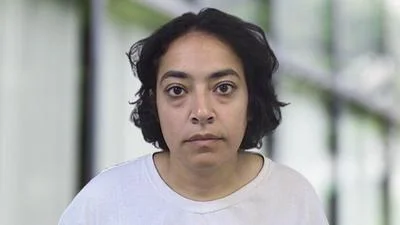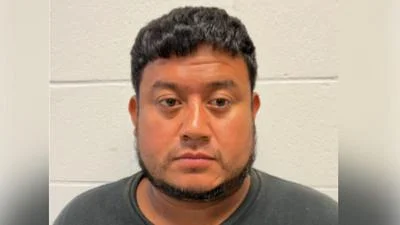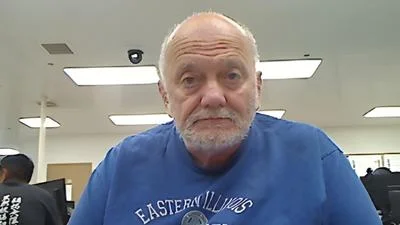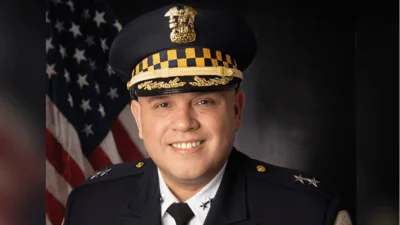State Representative Kambium Buckner | Illinois General Assembly
State Representative Kambium Buckner | Illinois General Assembly
According to the Illinois General Assembly site, the legislature summarized the bill's official text as follows: "Amends the Code of Criminal Procedure of 1963. Provides that a no-knock search warrant shall not be issued when the only offense alleged is possession of a controlled substance unless there is probable cause to believe that the controlled substance is for other than personal use. Provides that when an officer, having a warrant for the search of a dwelling, executes the search warrant, the officer shall: (1) execute the warrant between the hours of 9 a.m. and 7 p.m. unless the judge, for good cause, expressly authorizes execution at another time; (2) be readily identifiable as a law enforcement officer in uniform or wearing a visible law enforcement badge that clearly identifies the person as a law enforcement officer; (3) In counties of 90,000 or more inhabitants, be a member of a special weapons and tactics team or special response team, or another established team or unit trained and tasked with resolving high-risk situations and incidents, who has received appropriate training in the execution of arrest and search warrants authorizing entry without notice; (4) wear and activate a body-worn camera as required by the use of force in execution of a search warrant when entering a premises for the purpose of enforcing the law; (5) have a certified or licensed paramedic or emergency medical technician in proximity and available to provide medical assistance, if needed; (6) be prohibited from pointing firearms at individuals under 18 years old, unless there is clear and present danger to the officer or another person; and (7) knock and announce the officer's presence at a volume loud enough for the officer to reasonably believe the occupants inside can hear, allow a minimum of 30 seconds of time before entering given the size of the dwelling for someone to get to the door, and delay entry if the officer has reason to believe that someone is approaching the dwelling's entrance with the intent of voluntarily allowing the officer to enter the dwelling; except that this provision does not apply if the circumstances known to the officer at the time provide an objectively reasonable basis to believe that a no-knock entry or not waiting a reasonable amount of time is necessary because of an emergency threatening the life of or grave injury to a person, provided that the imminent danger is not created by the law enforcement officers executing the search. Makes other changes."
The following is our breakdown, based on the actual bill text, and may include interpretation to clarify its provisions.
In essence, this bill amends the Code of Criminal Procedure of 1963 to regulate the issuance and execution of search warrants in Illinois. It prohibits no-knock search warrants solely for possession of a controlled substance unless there is probable cause for distribution. Execution must occur between 9 a.m. and 7 p.m. unless a judge authorizes otherwise. Officers must be identifiable, equipped with body cameras, and coordinate with emergency medical personnel. Firearms cannot be pointed at individuals under 18 unless there's a clear danger, and officers must knock, announce their presence, and wait at least 30 seconds before entry unless an emergency justifies otherwise. The bill mandates the public reporting of data on executed warrants, including damage reports and negative raids, where no evidence or suspects are found.
Kam Buckner has proposed another three bills since the beginning of the 104th session.
Buckner graduated from the University of Illinois Urbana-Champaign with a BA and again from DePaul University College of Law with a JD.
Kam Buckner is currently serving in the Illinois State House, representing the state's 26th House District. He replaced previous state representative Christian Mitchell in 2019.
Bills in Illinois follow a multi-step legislative process, beginning with introduction in either the House or Senate, followed by committee review, floor debates, and votes in both chambers before reaching the governor for approval or veto. The General Assembly operates on a biennial schedule, and while typically thousands of bills are introduced each session, only a fraction successfully pass through the process to become law.
You can read more about bills and other measures here.
| Bill Number | Date Introduced | Short Description |
|---|---|---|
| HB1611 | 01/23/2025 | Amends the Code of Criminal Procedure of 1963. Provides that a no-knock search warrant shall not be issued when the only offense alleged is possession of a controlled substance unless there is probable cause to believe that the controlled substance is for other than personal use. Provides that when an officer, having a warrant for the search of a dwelling, executes the search warrant, the officer shall: (1) execute the warrant between the hours of 9 a.m. and 7 p.m. unless the judge, for good cause, expressly authorizes execution at another time; (2) be readily identifiable as a law enforcement officer in uniform or wearing a visible law enforcement badge that clearly identifies the person as a law enforcement officer; (3) In counties of 90,000 or more inhabitants, be a member of a special weapons and tactics team or special response team, or another established team or unit trained and tasked with resolving high-risk situations and incidents, who has received appropriate training in the execution of arrest and search warrants authorizing entry without notice; (4) wear and activate a body-worn camera as required by the use of force in execution of a search warrant when entering a premises for the purpose of enforcing the law; (5) have a certified or licensed paramedic or emergency medical technician in proximity and available to provide medical assistance, if needed; (6) be prohibited from pointing firearms at individuals under 18 years old, unless there is clear and present danger to the officer or another person; and (7) knock and announce the officer's presence at a volume loud enough for the officer to reasonably believe the occupants inside can hear, allow a minimum of 30 seconds of time before entering given the size of the dwelling for someone to get to the door, and delay entry if the officer has reason to believe that someone is approaching the dwelling's entrance with the intent of voluntarily allowing the officer to enter the dwelling; except that this provision does not apply if the circumstances known to the officer at the time provide an objectively reasonable basis to believe that a no-knock entry or not waiting a reasonable amount of time is necessary because of an emergency threatening the life of or grave injury to a person, provided that the imminent danger is not created by the law enforcement officers executing the search. Makes other changes. |
| HB1612 | 01/23/2025 | Creates the Illinois Appliance Standards Act. Directs the Illinois Environmental Protection Agency to adopt minimum efficiency standards for covered products. Provides for testing, certification, and labeling of covered products. Contains provisions concerning enforcement of the Act's requirements. Provides for administrative rulemaking by the Agency. Makes findings. Defines terms. |
| HB1423 | 01/16/2025 | Appropriates $5,500,000 from the General Revenue Fund to the Department of Human Services for a grant to Laureus Sport for Good Foundation USA for program and operating expenses for youth-development based sports initiatives. Effective July 1, 2025. |
| HB1292 | 01/13/2025 | Amends the Workers' Compensation Act. Provides that post-traumatic stress disorder is to be rebuttably presumed to arise out of and to be causally connected to the hazards of employment of a person employed as a firefighter, emergency medical technician (EMT), emergency medical technician-intermediate (EMT-I), advanced emergency medical technician (A-EMT), or paramedic. |






 Alerts Sign-up
Alerts Sign-up